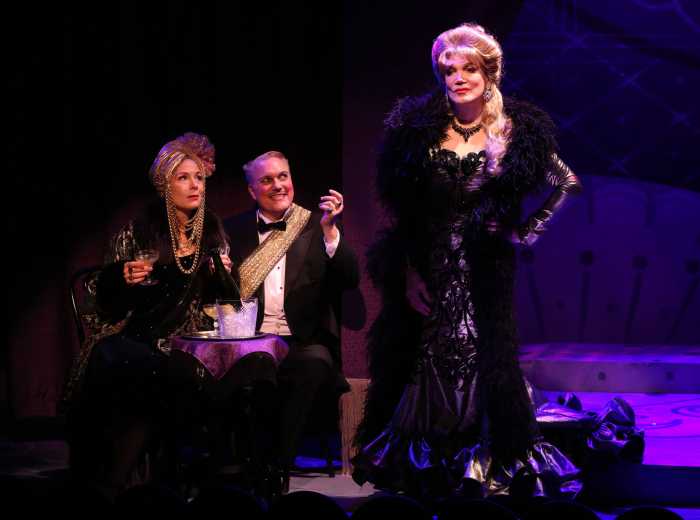Everett Quinton and Jason Cruz in Erasmus Fenn’s “Drop Dead Perfect,” directed by Joe Brancato. | PENGUIN REP
When an edgy, offbeat play transfers to Off Broadway, it’s easy to imagine the work has sprung from some fringy stage in the bowels of downtown Manhattan — or perhaps Bushwick. But “Drop Dead Perfect,” a madcap romp that manages to both skewer and honor noir melodramas from the 1950s, was incubated elsewhere. Stony Point, to be exact, in the wilds of Rockland County.
Helmed by Joe Brancato, artistic director of Penguin Rep Theatre, the enterprise could be mistaken for a long lost Charles Ludlam spoof. Propelled by a glowing review in the New York Times, the Penguin Rep production has landed at the Theater at St. Clements in the heart of the theater district, courtesy of the Peccadillo Theater Company.
And who better to star in this “adult comedy” than the illustrious Everett Quinton, Ludlam’s longtime companion and collaborator in the fabled Ridiculous Theatrical Company? (Tragically, Ludlam died of complications due to AIDS in 1987, just as his career was taking full flight.) Quinton plays Idris Seabright, the daffy mistress in a Florida manse whose life begins to unravel.
Dramatist Everett Quinton sustains the skewed tradition of Ridiculous Theatre
The production is transferring largely intact and also features Michael Keyloun doing double duty portraying the narrator and the drug-toting attorney and an often-shirtless Jason Cruz as the shady nephew from Cuba. The exception is Jason Edward Cook, who took over the role of an aspiring ingénue with a phallic fixation for the original actor who had a scheduling conflict.
Quinton, who has at least 75 productions under his belt, recently directed the exuberant revival of the Ludlam classic “The Mystery of Irma Vep.” Now he’s happy to hop out of the director’s chair and get back on the boards.
“The public likes to see me as these diesel women,” he said. “I was praying for a role like this to come along. It’s fun getting back into it.”
Unmistakably, “Drop Dead Perfect” has roots in the genre known as the Theatre of the Ridiculous, spearheaded in the 1960s by John Vaccaro’s Play-House of the Ridiculous and Ludlam’s Ridiculous Theatrical Company and later embraced by Charles Busch and Ryan Landry, among others. The genre’s hallmarks include men in female roles, a campy queer sensibility, fierce double entendres, and sly cultural references. The more tasteless and tawdry, the better.
Quinton believes that Ludlam’s troupe was among the first to draw on popular literature, cinema, and television as source material.
“Our whole culture is doing that now,” he said. “You can’t deny the influence.”
Brancato recalls being enthralled by the Ridiculous Theatrical Company, whose home was in a Sheridan Square basement in Greenwich Village.
“I went to see the joy and the downright audacity,” he said. “Charles’ philosophy was: if you think it’s funny, if you know it’s nasty, if you feel it’s working, then do it.”
Brancato laments that such risk-taking is scarce nowadays, whether in commercial theater or even not-for-profit, where the stakes are so high it might as well be commercial.
“Seeing Everett in that world was amazing, and I’m ecstatic he has joined us in our throwback thriller,” he enthused. “His work is genius.”
“Drop Dead Perfect” bears more than a passing resemblance to “Irma Vep.” Both plays open with a raging thunderstorm, feature a menacing portrait above a fireplace mantel, and are obsessed with flora like pyracantha and bougainvillea.
Brancato feels the play embraces a similar sense of brash abandon.
“It’s a salute to what Charles was about, rather than an imitation,” he said. “Trying to replicate anything is not artistically satisfying and you always fall short. One can paint a mustache on the Mona Lisa and that’s fun. Trying to paint the Mona Lisa again? Not so much.”
Brancato explained, “Some people see it as a wacky little thriller, others catch the allusions and enjoy it on a deeper level. It’s very naughty in the best sense of the word.”
But was he worried it might be too racy for Stony Point?
“Suburbia no longer has issues with risqué,” he said. “Theater is tame now compared to what comes into their living rooms over cable TV. This play is different from what we normally do. It was a brave step, and that’s what the Ridiculous was about. I always wanted to mount something like this.”
A truism in theater is that comedy is much harder to pull off than tragedy. And while a play’s appeal depends on the skills of the ensemble and the creative team, Brancato credits another factor, as well: the audience.
“A comedy is successful if people are ready to have a good time,” he said. “If you’re hosting a dinner, you can serve all the martinis you want, but if the guests are in a bad mood the party goes south.”
Brancato praised the unique, communal joys of live theater.
“We used to go to the movies and now we do Netflix,” he noted. “We used to go to flea markets and now we sell on eBay. Synagogues, churches, and theater are basically the only places that we gather. Give me the frickin’ theater any day.”
The subversive spoof is the brainchild of Erasmus Fenn, who, as it happens, is actually a pseudonym, adding a layer of mystery. So who is this enigmatic figure?
“What can I say about Erasmus Fenn?,” Brancato mused. “He lives in the Bronx but is agoraphobic. He always wanted to pen such a tale. He has clearly put his ego aside and is letting the collaboration between Everett and myself live.”
Although the Ridiculous Theatrical Company was born in 1967, Quinton didn’t join until 1976, by which time it had become less explosive.
“The pendulum was swinging back,” Quinton recalled. “You could not get away with things in the ‘70s that you could do in the ‘60s.”
He cited an early, particularly scandalous play titled “Conquest of the Universe,” based on Marlowe’s “Tamburlaine,” that lifted a shocking scene from Shakespeare’s “Titus Andronicus” where they bake the two sons in a pie and feed them to the Emperor.
“[One actor] put nine cocktail franks up his ass and shit them out onstage in front of the public,” Quinton said. “Scatological humor represents anger in the theater, and Ridiculous Theatre was borne out of rage.”
In fact, Quinton believes that the Theatre of the Ridiculous offered the first honest gay voice on stage.
“We were an oppressed minority group with no rights, and this theater allowed us to say, ‘We’re queer and you can go fuck yourself if you don’t like that,’” he said.
While no cocktail franks appear in “Drop Dead Perfect,” there is a bit of racy business involving a crème sandwich cookie.
Another prolific Ridiculous acolyte, Charles Busch (“Vampire Lesbians of Sodom”), is often compared to — and confused with — Charles Ludlam. I couldn’t help wondering if Quinton and Busch have a fuming rivalry — you know, kind of like Joan Fontaine and Olivia de Havilland.
“In the early years I was a bit jealous,” Quinton admitted. “He was an upstart. But we have been friends for a long time. I love Charles and consider him a dear heart. I don’t know how he feels about me.”
Although rehearsals prevented Quinton from joining New York’s recent Gay Pride celebrations, he did manage to catch some of the parade.
“There was the cutest cop,” he said excitedly. “He was very friendly and had this beatific smile. In the olden days, the cops were not friendly to us. In fact, every time the gay cops would march by in the parade, the straight cops would turn their backs on them.”
Quinton continued, “I love that we stop traffic and that we make police work overtime to protect us. We are taxpayers, too. We deserve it.”
DROP DEAD PERFECT | Peccadillo Theater Company and Penguin Rep | Theatre at St. Clements, 423 W. 46th St. | Jul. 15-Aug. 10: Wed.-Sat. at 8 p.m.; Sat., Sun. at 3 p.m. | $25 at dropdeadperfect.com or 845-786-2873


















